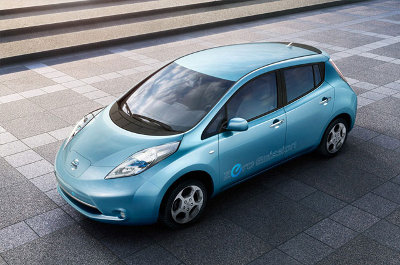Jun 23rd, 2010 by Ross Edwards

The Nissan Leaf, which will be the first all-electric vehicle to go on sale in America from a major automaker when it hits dealers in December, may get a gasoline engine at some point. Nissan says that while the Leaf will initially only be available as a pure electric vehicle, an extended range version of the EV could be built.
At the Automotive News Green Car Conference, Nissan’s Senior Vice President for Sales and Marketing Brian Carolin said that an extended range Leaf EV is a possibility, according to Autoblog Green.
While an extended range EV and a gasoline-electric hybrid are similar, there are some major differences. An extended range EV has a gasoline engine that does not power the wheels directly but instead charges the car’s batteries, which allows the electric motor to continue running after its charge has run out. A hybrid’s gasoline engine is the primary power source. The smaller batteries and less powerful electric motor are used to power the car at slow speeds and assist the gas engine.
The Chevrolet Volt, which will be released in November, will only be available as an extended range EV with a gas engine. Chevy says that the decision to not offer the Volt as a pure EV was so that the Volt can be used as a primary vehicle. Extended range EVs do not require hours of charging to travel past the range of their batteries, so they can be easily used for road trips.
Image via Nissan.

[…] that the 2011 Volt will cost $33,500 after a $7,500 federal tax credit. That puts it well above the Nissan Leaf, the only other mass produced electric car that will be available next year. The Leaf will cost […]